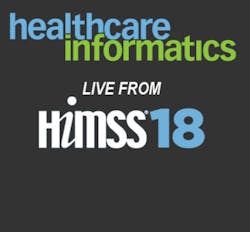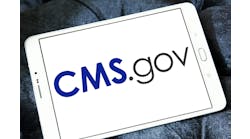BREAKING NEWS: At HIMSS18, CMS’s Verma Announces MyHealthEData Initiative, to Give Patients Control of their Data
On Tuesday morning, March 6, at the Sands Convention Center in Las Vegas, on the second full day of the annual HIMSS Conference, Seema Verma, Administrator of the federal Centers for Medicare and Medicaid Services (CMS), announced the launch of a new initiative called “MyHealthEData,” aimed at revolutionizing the relationship of U.S. healthcare consumers to their patient data.
Verma spoke to about 1,000 people at 9 AM Pacific time in Las Vegas at the Sands; at about the same time, CMS’s website carried the announcement, which stated that, “Today, Centers for Medicare & Medicaid Services (CMS) Administrator Seema Verma announced a new Trump Administration initiative – MyHealthEData – to empower patients by giving them control of their healthcare data, and allowing it to follow them through their healthcare journey.”
As the CMS announcement stated, “Last year President Trump issued an Executive Order to Promote Healthcare Choice and Competition Across the United States. In response the Administration is moving towards a system in which patients have control of their data and can take it with them from doctor to doctor, or to their other healthcare providers. The government-wide MyHealthEData initiative is led by the White House Office of American Innovation with participation from the Department of Health and Human Services (HHS) – and its Centers for Medicare & Medicaid Services (CMS), Office of the National Coordinator for Health Information Technology (ONC), and National Institutes of Health (NIH) – as well as the Department of Veterans Affairs (VA). The initiative is designed to empower patients around a common aim - giving every American control of their medical data. MyHealthEData will help to break down the barriers that prevent patients from having electronic access and true control of their own health records from the device or application of their choice. Patients will be able to choose the provider that best meets their needs and then give that provider secure access to their data, leading to greater competition and reducing costs.”
CMS Administrator Seema Verma on Monday morning (credit: PeterAshkenaz, Office of the National Coordinator)
Further, the announcement said, “The MyHealthEData initiative will work to make clear that patients deserve to not only electronically receive a copy of their entire health record, but also be able to share their data with whomever they want, making the patient the center of the healthcare system. Patients can use their information to actively seek out providers and services that meet their unique healthcare needs, have a better understanding of their overall health, prevent disease, and make more informed decisions about their care.”
The announcement added, “Today in an address at the Healthcare Information and Management Systems Society (HIMSS) Annual Conference in Las Vegas, Administrator Verma also announced the launch of Medicare’s Blue Button 2.0 – a new and secure way for Medicare beneficiaries to access and share their personal health data in a universal digital format. This enables patients who participate in the traditional Medicare program to connect their claims data to the secure applications, providers, services, and research programs they trust. For example, Medicare’s Blue Button 2.0 will allow a patient to access and share their healthcare information, previous prescriptions, treatments, and procedures with a new doctor which can lead to less duplication in testing and provide continuity of care. Medicare’s Blue Button 2.0 is expected to foster increased competition among technology innovators to serve Medicare patients and their caregivers, finding better ways to use claims data to serve patients’ health needs.” With regard to the Blue Button program, Verma noted that, while Medicare beneficiaries have for a few years now had access to some of their Medicare claims via Blue Button functionality, that data has been in raw form, without any contexting that could make it truly useful for Medicare patients; and Blue Button 2.0 will facilitate that needed contexting. “Currently,” she said, “we give our beneficiaries this data in Excel or PDF formats, without any help in helping them to understand the context of it. That’s useless if that’s hard to understand.”
Administrator Verma also spoke of the need to move forward to empower patients with their data and information, in remarkably personal terms, recounting an episode in which her husband had collapsed while the two of them were not together, and was rushed to an emergency department, for what turned out to be heart failure. “He spent a week in the hospital,” she recalled. “At the end, we asked for his records at discharge. The doctors looked a little bit uncomfortable. After a little while, they handed me five pages of paper, which was essentially a discharge summary, and a CD-ROM. After the federal government has spent $30 billion in EHRs, providers are producing CD-ROMs???” she exclaimed. “Most computers don’t even take CD-ROMs anymore. And when I finally accessed the information on the CD-ROM, it was missing a lot of clinical information, including recent tests. This isn’t just my experience, it’s happening to patients all over the country. It’s all too common to patients to have to drive to separate locations to access their records. A doctor I spoke with last month had twins, and it took him, a doctor, six months, to access his children’s records.” Such experiences, now in 2018, are totally unacceptable, she made it clear. And she made it clear that she believed that the MyHealthEData initiative could force the entire healthcare industry to reform itself to improve things, from hospitals and physician practices, to health insurers, to EHR vendors.
“The reality,” Verma said, “is that once the information is freely flowing from patient to provider, the advances in coordinated, value-based care, will be greater than anything we could imagine today. Things could have been different for my family if my husband could have authorized me to have his health records on his phone,” she said. “Or if he could have notified me that he was in distress. And better yet, maybe we could have predicted his cardiac arrest days before, if his watch could have tracked his health data, and sending that data to alert his doctor, and possibly prevent what happened. My husband is part of the 1 percent that survives his condition. We shouldn’t have to depend on chance” for that type of outcome, she emphasized.
“Through the MyHealthEData initiative,” Verma continued, “this administration is focused on putting patients first, truly first, by giving them the information they need to truly improve their health. This administration will pull every lever to create a health information ecosystem that tailors the health system” to improve outcomes, she said. “Our administration is completely aligned”—including across the Veterans Administration healthcare system, the Department of Defense, and other healthcare-related federal agencies—"to achieve this goal. And the time is now. Hospitals and doctors” have extensive access to electronic patient records, she noted, “and nearly everyone has access to a smartphone. And smartphones in particular create the portability needed to create mobility… Uniform standards being drafted in the 21st Century Cures Act that will allow for information-sharing. The technology and regulatory requirements are finally coming together,” she emphasized.
In all this, Verma said, “Privacy and security of patient data will be the center of all of our efforts. We must protect the privacy and security of patient data. CMS will be announcing a complete overhaul of the meaningful use program for hospitals and the advancing care information category” under the MIPS (Merit-based Incentive Payment System) program for physicians. “Ensuring the security of healthcare data will be an absolute requirement to avoid negative” payment penalties under MIPS, she said. “We will be laser-focused on increasing interoperability and giving patients access to their data. Last year, CMS finalized requirements around EHR certification. This ensures that patients will be able to share data via APIs”—application programming interfaces.
Meanwhile, she said, “We are also ensuring that hospitals and doctors are not engaged in data-blocking. We will not tolerate this practice anymore. It’s not acceptable to limit patient records or to prevent them from seeing their complete history outside their particular healthcare system. It’s the priority of this administration to make sure that every patient can access” their full patient records.
In addition, Verma announced, “We’re going to overhaul E&M codes”—the requirements under Medicare around documenting evaluation and management codes in the patient record, on the part of physicians—“to make it easier to document. We will be updating and streamlining them, so doctors can spend less time using their EHRs and more time seeing patients.”
Verma called on all stakeholder groups within U.S. healthcare to play their part in these changes, including health insurers. “Today, we are calling on private health plans to join us in sharing their data with patients because enabling patients to control their Medicare data so that they can quickly obtain and share it is critical to creating more patient empowerment,” Verma said in her speech.
Further, the CMS Administrator noted, “In Medicaid, we will be working with states to make sure they can make their claims data available to beneficiaries as well. And now, I call on all insurers to give their patients their claims data electronically. Over the course of the year, we will be examining all the ways we can work with health insurers, to make sure we can make this [happen]. We will also shift our focus to patient access to data. And we will be studying ways to reduce duplicate and unnecessary testing. Work against duplicate tests and unnecessary treatments. For those in the healthcare industry who are already working to make data more secure and available, we give you our full support, and will work with you. However, for those of you who still subscribe to the outdated idea that they can restrict patients’ access to their data, I encourage you in the strongest terms” to rethink those old notions.
“Let’s empower our patients to achieve access to their records whenever and wherever they choose,” Verma said at the conclusion of her speech. “We cannot do this alone, but together,” amazing things are possible. “Ten years from now, I hope we will look back on today as the start of a new era… and let’s make sure that what we’ve announced in Vegas doesn’t stay in Vegas.”
Verma was introduced by Jared Kushner, who in his role as the lead in the Office of American Innovation, Verma recognized as a partner in the federal healthcare agencies’ efforts to move the healthcare industry forward around data and information issues.



